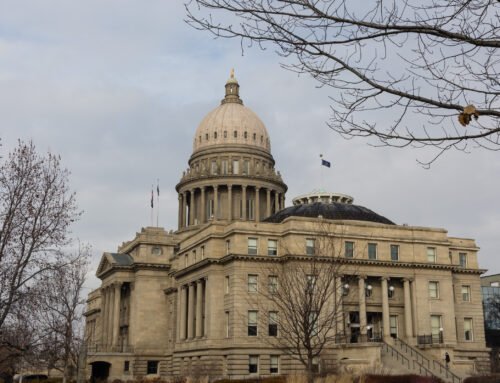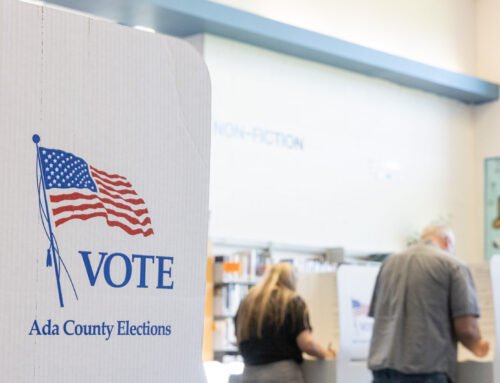A lawyer for Boise-based Babe Vote and the League of Women Voters Idaho argued at a court hearing Friday that a new law passed in the 2023 legislative session is making it harder for voting advocacy groups to register voters.
Meanwhile, the defense argued that the new law is constitutional, and it makes the registration requirements easier to understand for both registrants and election officials. The new law created a new and free ID card offered by the Idaho Transportation Department for people age 18 and older who have not had a driver’s license in the previous six months. That ID card will be accepted for voter registration and voting requirements.
Matthew Gordon, the attorney representing the two groups argued in favor of a preliminary injunction to halt the enforcement of House Bill 340 — a law is designed to standardize voter registration procedures across the state so that the requirements are the same for registering to vote in-person on Election Day as they are for filling out a voter registration card at a summer event or registering online.
In July, the voter groups suspended their voter registration efforts and filed the motion in Ada County District Court against Secretary of State Phil McGrane after the new law came into effect.
Voter registration policies and practices varied by county before the law came into effect, and the new law addresses the lack of clarity for the type of documentation an applicant must show to prove residence in order to complete voter registration, McGrane said, the Idaho Capital Sun previously reported.
Group seeks injunction to halt Idaho voter registration law requiring proof of identity, residency
New voter registration law creates ‘irreparable injury,’ plaintiff argues
A principal part of the lawsuit argues that the new law makes it difficult for youth voters and people without a driver’s license to register to vote.
Babe Vote typically helps youth register to vote at festivals, high schools and college campuses but has since suspended its voter registration operations since the new law took effect.
During the hearing, defense attorney Lincoln Wilson said another recent change in Idaho law to disallow student IDs as a form to register does not discriminate against young voters.
In a presentation to the court, Wilson showed data from the Secretary of State’s Office reflecting that out of the 18 to 24 year olds who voted in the November 2022 election, only 0.4% of them used student IDs at the polls.
Gordon rebutted this claim, noting that this statistic does not represent how many people used student IDs to register to vote outside of the polls.
Additionally, data from the Secretary of State’s office released to the court on July 28 shows that data used in the previous statistic only represented 30 out of 44 Idaho counties. Of the 21,000 Idaho voters between 18 and 24 years old, the Secretary of State’s office only has ID information for 13,000 young voters.
“An unconstitutional law does not become constitutional merely because it affects only a relatively small number of voters,” the plaintiff argued in the lawsuit.
Sam Sandmire, a board member with Babe Vote, told the Sun in an interview Friday that before the law took place, the organization had no difficulties registering people to vote.
“In June, Babe Vote volunteers registered 100 voters in Idaho Falls,” she said. “That was before the July 1 enactment of HB 340. We tried again on the Fourth of July in the same place in Idaho Falls, and we were not able to help people complete their voter registration because of this new law.”
Sandmire said the requirement to prove residency also makes it more difficult to register seniors, people with disabilities, people without a vehicle and homeless people.
In a letter in support of the preliminary injunction, Kendal Shaber, the youth engagement and voter outreach coordinator for the Boise area for the League of Women Voters of Idaho, said the confusion caused by HB 340 led the organization to also suspend its statewide registration efforts.
Shaber has worked in that role since 2018, and she is responsible for organizing registration drives and establishing and maintaining relationships with community organizations.
“The league has largely been unable to advance to its core mission of promoting the right to vote and helping citizens from across the political spectrum to register during the month of July, which is typically one of the league’s most successful months for registering new voters,” she said in the letter. “Every day that goes by without injunctive relief compounds that injury.”
The court has not yet set a date for a hearing on the decision of a preliminary hearing, and the case will proceed regardless of the court’s ruling for a preliminary injunction.
GET THE MORNING HEADLINES DELIVERED TO YOUR INBOX






Leave A Comment